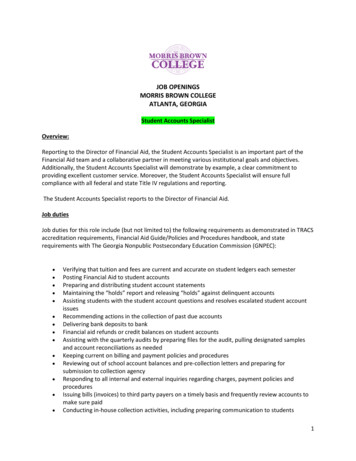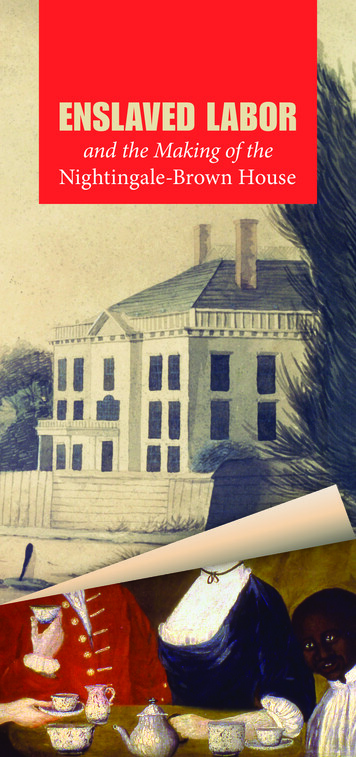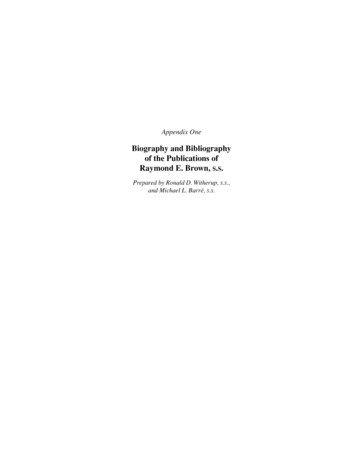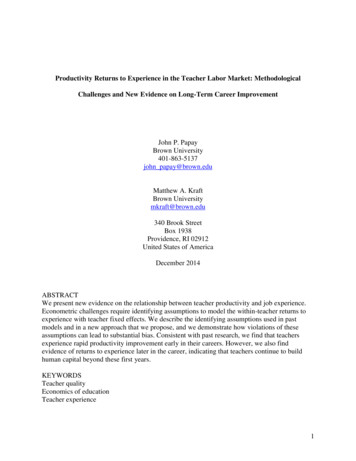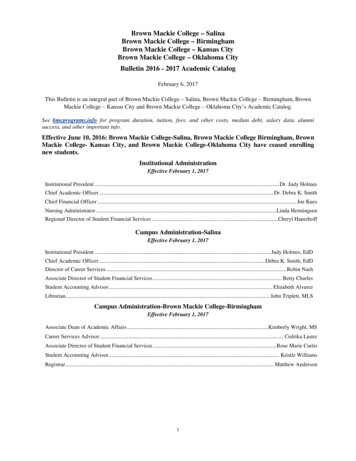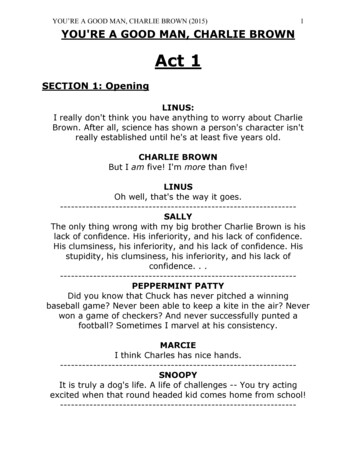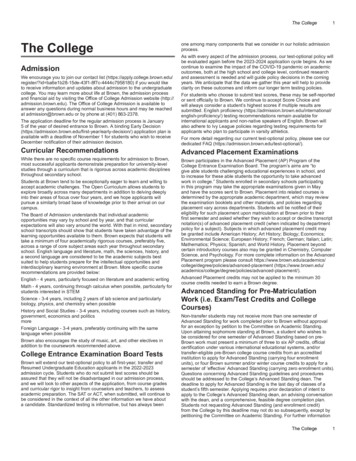
Transcription
The CollegeThe CollegeAdmissionWe encourage you to join our contact list (https://apply.college.brown.edu/register/?id ba6e1b28-15de-43f1-8f7c-4444c7958180) if you would liketo receive information and updates about admission to the undergraduatecollege. You may learn more about life at Brown, the admission processand financial aid by visiting the Office of College Admission website (http://admission.brown.edu). The Office of College Admission is available toanswer any questions during normal business hours and may be reachedat admission@brown.edu or by phone at (401) 863-2378.The application deadline for the regular admission process is January5 of the year of desired entrance to Brown. A binding Early rly-decision/) application plan isavailable with a deadline of November 1 for students who wish to receiveDecember notification of their admission decision.Curricular RecommendationsWhile there are no specific course requirements for admission to Brown,most successful applicants demonstrate preparation for university-levelstudies through a curriculum that is rigorous across academic disciplinesthroughout secondary school.Students at Brown tend to be exceptionally eager to learn and willing toaccept academic challenges. The Open Curriculum allows students toexplore broadly across many departments in addition to delving deeplyinto their areas of focus over four years, and we hope applicants willpursue a similarly broad base of knowledge prior to their arrival on ourcampus.The Board of Admission understands that individual academicopportunities may vary by school and by year, and that curricularexpectations will also vary around the world. With that in mind, secondaryschool transcripts should show that students have taken advantage of thelearning opportunities available to them. Brown expects that students willtake a minimum of four academically rigorous courses, preferably five,across a range of core subject areas each year throughout secondaryschool. English language and literature, math, the sciences, history, anda second language are considered to be the academic subjects bestsuited to help students prepare for the intellectual opportunities andinterdisciplinary learning environment at Brown. More specific courserecommendations are provided below:English - 4 years, particularly focused on literature and academic writingMath - 4 years, continuing through calculus when possible, particularly forstudents interested in STEMScience - 3-4 years, including 2 years of lab science and particularlybiology, physics, and chemistry when possibleHistory and Social Studies - 3-4 years, including courses such as history,government, economics and politicsmoreForeign Language - 3-4 years, preferably continuing with the samelanguage when possibleBrown also encourages the study of music, art, and other electives inaddition to the coursework recommended above.College Entrance Examination Board TestsBrown will extend our test-optional policy to all first-year, transfer andResumed Undergraduate Education applicants in the 2022-2023admission cycle. Students who do not submit test scores should beassured that they will not be disadvantaged in our admission process,and we will look to other aspects of the application, from course gradesand curricular rigor to insight from counselors and teachers, to assessacademic preparation. The SAT or ACT, when submitted, will continue tobe considered in the context of all the other information we have abouta candidate. Standardized testing is informative, but has always been1one among many components that we consider in our holistic admissionprocess.As with every aspect of the admission process, our test-optional policy willbe evaluated again before the 2023-2024 application cycle begins. As wecontinue to examine the impact of the COVID-19 pandemic on academicoutcomes, both at the high school and college level, continued researchand assessment is needed and will guide policy decisions in the comingyears. We anticipate that the data we gather this year will help to provideclarity on these outcomes and inform our longer term testing policies.For students who choose to submit test scores, these may be self-reportedor sent officially to Brown. We continue to accept Score Choice andwill always consider a student’s highest scores if multiple results aresubmitted. English proficiency -proficiency/) testing recommendations remain available forinternational applicants and non-native speakers of English. Brown willalso adhere to Ivy League policies regarding testing requirements forapplicants who plan to participate in varsity athletics.For more detail regarding our current test-optional policy, please see ourdedicated FAQ ced Placement ExaminationsBrown participates in the Advanced Placement (AP) Program of theCollege Entrance Examination Board. The program’s aims are “togive able students challenging educational experiences in school, andto increase for these able students the opportunity to take advancedwork in college.” Students enrolled in secondary schools participatingin this program may take the appropriate examinations given in Mayand have the scores sent to Brown. Placement into related courses isdetermined by the appropriate academic department, which may reviewthe examination booklets and other materials, and policies regardingplacement vary across departments. Students will be notified of theireligibility for such placement upon matriculation at Brown prior to theirfirst semester and asked whether they wish to accept or decline transcriptnotation(s) of advanced placement credit (when indicated by departmentpolicy for a subject). Subjects in which advanced placement credit maybe granted include American History; Art History; Biology; Economics;Environmental Science; European History; French; German; Italian; Latin;Mathematics; Physics; Spanish; and World History. Placement beyondcertain introductory courses also may be granted in Chemistry, ComputerScience, and Psychology. For more complete information on the AdvancedPlacement program please consult icies/advanced-placement licies/advanced-placement/).Advanced Placement credits may not be applied to the minimum 30course credits needed to earn a Brown degree.Advanced Standing for Pre-MatriculationWork (i.e. Exam/Test Credits and CollegeCourses)Non-transfer students may not receive more than one semester ofAdvanced Standing for work completed prior to Brown without approvalfor an exception by petition to the Committee on Academic Standing.Upon attaining sophomore standing at Brown, a student who wishes tobe considered for one semester of Advanced Standing based on preBrown work must present a minimum of three to six AP credits, officialcertification under various international educational systems, and/ortransfer-eligible pre-Brown college course credits from an accreditedinstitution to apply for Advanced Standing (carrying four enrollmentunits), or four Brown summer and/or winter course credits to apply for asemester of ‘effective’ Advanced Standing (carrying zero enrollment units).Questions concerning Advanced Standing guidelines and proceduresshould be addressed to the College’s Advanced Standing dean. Thedeadline to apply for Advanced Standing is the last day of classes of astudent’s fifth semester. Applying requires prior declaration of intent toapply to the College’s Advanced Standing dean, an advising conversationwith the dean, and a comprehensive, feasible degree completion plan.Students not requesting Advanced Standing (and enrollment credit)from the College by this deadline may not do so subsequently, except bypetitioning the Committee on Academic Standing. For further informationThe College1
2The Collegeplease visit icies/advanced-standing licies/advanced-standing/).Transfer Admission from Other CollegesTo be eligible for transfer admission, you must have completed at leastone full year of college study (or its equivalent) before your plannedmatriculation at Brown. Both part-time and full-time students at accreditedtwo- and four-year colleges may seek transfer admission. University rulesstipulate that anyone admitted as a transfer must be enrolled full-timeat Brown for at least four semesters prior to earning an undergraduatedegree. For this reason we discourage transfer applications from studentswho will have accrued more than four semesters of college work priorto their enrollment at Brown. Students who have already completed abachelor’s degree at another college are ineligible to apply as transfers,while high school students who are currently enrolled in dual-degreeprograms or early college programs are ineligible to apply as transfers andshould apply as first-year applicants.Generally speaking, most liberal arts courses taken at other collegesand universities are transferable to Brown. More specifically, Brown willtransfer credit for courses at other colleges that are similar to coursesoffered in our own curriculum (https://cab.brown.edu/). Brown will notaward transfer credit for correspondence courses, online courses, coursestaken during summer programs or for courses taken as part of a dualenrollment curriculum. More information about transfer admission (https://admission.brown.edu/transfer/) is available through the Office of CollegeAdmission.Visiting Undergraduate StudentsEach year, Brown welcomes visiting students from partner institutionsboth in the United States and abroad. In addition, a limited number ofstudents enrolled as full-time degree candidates at other colleges mayapply to spend one or two semesters at Brown to pursue areas of studynot otherwise available to them for credit at their own institutions.The Visiting Undergraduate Student Program welcomes applicantswho wish to enroll in undergraduate-level academic work during thefall or spring semesters, or during the Summer Session. Most VisitingUndergraduate Students hold full-time status during their time on Brown’scampus. This program is not intended for high school graduates whowish to spend a gap year or gap semester at Brown, nor is it intended forstudents who have already earned a bachelor’s degree.Resumed Undergraduate Education ProgramThe Resumed Undergraduate Education (RUE) Program is a small, highlycompetitive program ideal for students who interrupted or delayed theirformal education due to family commitments, financial concerns, healthissues, military service, employment opportunities, or simply a compellingneed to explore other paths. Applicants must have earned a high schooldiploma or equivalent and have been out of high school for six or moreyears by the time of proposed enrollment at Brown. More informationabout RUE admission (https://admission.brown.edu/rue/) is availablethrough the Office of College Admission website.U.S. Military VeteransBrown values the extraordinary talents, experiences and diversitythat veterans bring to campus. Veterans and currently serving militarypersonnel are highly encouraged to apply via Brown’s VeteransApplication (https://apply.college.brown.edu/apply/?sr cb5ff848fb9a-465e-be4a-25c6f54ec1f), regardless of their year of high schoolgraduation or any college credits earned to date. In appreciation of yourservice, there is no application fee. More information about the applicationprocess is available here (https://admission.brown.edu/veterans/).Brown is a proud college partner of Service to School's VetLink Program(https://service2school.org/vetlink/), which provides free applicationmentoring and networking to veterans. We are also a longstanding partnerof the Marine Corps Leadership Scholar Program ship-scholar/) (LSP), which assistsMarines intending to pursue their undergraduate degree at highly selectiveinstitutions. The university has also undertaken a number of initiatives2The rans/) to double ourenrollment of undergraduate student veterans.Requirements for Baccalaureate DegreesBaccalaureate Degree ProgramsAt Brown, two baccalaureate degrees are awarded—the Bachelor ofArts (A.B.) and the Bachelor of Science (Sc.B.). The degree awardedis determined by a student’s chosen concentration program. All Brownundergraduates must complete the requirements for either an A.B. or aSc.B. in order to earn the baccalaureate degree at Brown.The Sc.B. degree recognizes a science concentration that demonstratesboth breadth and depth in science beyond the minimum required for theA.B. degree in the same field. An Sc.B. program normally follows theseguidelines:1. The concentration program, with the exception of Engineering, shallrequire no more than ten courses in any one department. The totalnumber of concentration courses required shall not exceed twenty(twenty-one for Engineering).2. At least one semester course of independent study, research, ordesign in the concentration discipline must be included.3. Additional electives must be chosen to meet the quantity requirementfor all baccalaureate degrees. In cases, where the student maysuccessfully complete the Sc.B. degree on the basis of oneconcentration as well as an additional concentration associated withan A.B. degree, only one degree (Bachelor of Science) is awardedupon graduation. *See below for requirements associated withcombined degrees.Degrees with DistinctionBaccalaureate degrees may be awarded with distinction (magna cumlaude) to those students whose percentage of quality grades -- grades of“A” or “S with Distinction” -- in courses taken at Brown puts them in thetop 20% of the entire undergraduate graduating class. The Registrar willprovide an opportunity for students to indicate that they do not wish to beconsidered for a degree with distinction.Quantity and Progress RequirementsIn order to graduate with a Brown baccalaureate degree, a studentmust successfully complete at least 30 course credits (equivalent to 120semester hours), 15 of which must be taken at Brown. A maximum of 4summer and/or Brown Wintersession courses may be applied toward thisrequirement. Approved study at another institution may also count towardthe 30-course credit degree requirement.The standard semester course load at Brown is four courses. Full-timestudents are permitted to enroll in a maximum of five courses/credits in agiven semester; students may take three courses in a semester as longas doing so will not bring them below the level of good academic standing.A student may not enroll in fewer than three courses in any semesterwithout written permission from a designated academic dean. ResumedUndergraduate Education students may study on either a full-time or lessthan full-time basis with permission from the RUE academic dean.Residence RequirementWith the exception of students admitted to the Resumed UndergraduateEducation (RUE) Program, every candidate for a baccalaureate degreemust be in residence at Brown for at least four semesters as a full-timestudent. Credits from Brown Exchange programs, Brown ApprovedAlternative Study Abroad programs, and the Brown Summer School do notapply to the residency requirement. Students in the RUE Program must bein residence for the equivalent of four full-time semesters. RUE studentsmay study on a less than full-time basis, if they have secured permissionfrom the RUE academic dean and presented a viable degree completionplan. Every student must spend sufficient time in concentration studies topermit faculty evaluation of his or her concentration.Writing RequirementLearning to write well is a developmental process that occurs overtime. Brown students are therefore required to work on their writing at
The Collegeleast twice: once in their first two years of study, and a second time insemesters 5-7 (or the penultimate semester). Students must complete anapproved course at Brown in their first two years of study. Exceptions aremade for transfer students, who may meet this part of the requirement withan approved course in the subjects of either COLT, ENGL, or LITR fromtheir prior institution, and for students in the Brown RISD Dual Degreeprogram who are required to take at least one writing designated course atBrown.In semesters 5-7 (or the penultimate semester), all students mustdemonstrate that they have worked on their writing a second time in acourse they have taken at Brown (study away courses are ineligible).Students may take another approved course to meet this part of therequirement, or if approved by a participating concentration, they mayupload a substantial piece of writing developed within the concentration.Writing completed in courses taken away from Brown will not meet Part2 of the writing requirement. Learn more about the University WritingRequirement rriculum/writing-requirement/).Concentration RequirementAn academic concentration is the focal point for a student’s undergraduateeducational experience at Brown. It is an in-depth study centering ona discipline or disciplines, a problem or a theme, or a broad question.Concentrations aid intellectual development by encouraging conceptualand methodological study on a sophisticated level. A concentrationmay coincide in some ways with specific prerequisite training forprofessional goals, but professional training is not the central aspectof the concentration process. Rather, the concentration is designed tofoster students’ command of an area of knowledge and ability to use aconcentration’s concepts and methods in a coherent manner.Brown offers standard concentrations that lead to either the Sc.B. orthe A.B. degree. In keeping with the philosophy of the open curriculum,students may design an independent concentration if standardconcentration offerings do not match their interests. Independentconcentration proposals are sponsored by at least one faculty memberand must be reviewed and approved by a subcommittee of the CollegeCurriculum Council.A listing of departmental and interdepartmental concentration programsthat are currently available may by found at: ons/. The programs have been approvedand are subject to periodic review by the College Curriculum Council.Guidelines for preparing an independent concentration proposal are on theDean of the College website.All students (with the exception of incoming junior transfers) must request,in writing, admission to a concentration program no later than the middleof their fourth semester, before pre-registering for semester five (usuallyspring semester of sophomore year). The written proposal should outlinethe student’s major objectives in choosing the concentration, while alsolisting the specific courses to be taken. This proposal functions as a kind ofcontract, and is signed jointly by the student and the concentration advisorfor the relevant department or program. Once the contract has beensigned, the departmental concentration advisor becomes the student’sadvisor for the remainder of his or her time at Brown.Students may complete as many as three concentrations during aregular four-year program; Brown does not offer minors. A student whosatisfactorily completes more than one concentration program may havethat fact indicated on his or her permanent record. In order to accomplishthis, the student must have filed a declaration for each concentrationand had it "advisor approved" by the last day of classes in the student’spenultimate semester (for most students this is seventh semester).Sponsorship and authorization of each concentration program shall followthe usual procedures.No student will be permitted to register for his or her fifth semester unlessa declaration of concentration has been filed. Exceptions are made forincoming junior transfers and for students in the Brown RISD Dual Degreeprogram. Students failing to complete registration on time because of thefailure to file a concentration declaration will be subject to the same actiontaken by the University for all cases of late registration (see FinancialInformation .3Honors in the Concentration: Students whose work in the field ofconcentration has demonstrated superior quality and culminated inan honors thesis of distinction are awarded departmental honors atCommencement. The designation “Honors” is included on the student'stranscript and diploma. No distinctions are made among quality levelsof honors work. Students considering honors work should consult theirdepartmental, interdepartmental, or independent concentration advisor.Recommendations for honors are due in early May precedingCommencement. Brown does not grant honors retroactively. Therefore,students who consider taking a grade of Incomplete in a thesisproject should understand that they will not receive honors unless thethesis is completed in time to be evaluated by faculty readers and arecommendation submitted before graduation.Enrollment RequirementBy decision of the Corporation, prior to the awarding of a baccalaureatedegree each student is required to accumulate eight semesters, or 32units, of enrollment credit. The eight-semester enrollment requirementis separate from and in addition to any other degree requirements.A semester of enrollment credit can be earned by studying full-timeat Brown for a semester, by transferring in a full semester’s worth ofwork from an approved program of study at another institution, and asaforementioned from select pre-matriculation exam or test credits such asfrom the Advanced Placement (AP) program and from some internationalcertification programs such as the British A-Levels and the InternationalBaccalaureate. Brown Summer or Winter courses do not count toward theenrollment requirement unless students successfully earn four summer/winter course credits at Brown. (See section below on Tuition RegulationsRelating to Brown Summer/Winter Session Courses.)Requirements for Combined DegreeProgramsCombined A.B./Sc.B. DegreeStudents who wish to earn a combined A.B. and Sc.B. degree maydo so in a five-year program in which work for both degrees proceedsconcurrently. Students who elect this five-year plan will usually arrangetheir programs of study so that they may change to either degreecandidacy alone prior to the fourth year.Requirements for this degree program are as follows: Declaration of intent. A formal application approved by the appropriatedean must be filed with the Registrar no later than the student’s fifthsemester of study. Satisfactory completion of the Sc.B. requirements for a standardconcentration program in the life sciences, physical sciences ormathematics, or an approved independent Sc.B. program spanningone or more of these areas. Satisfactory completion of the A.B. requirements for a standard orindependent concentration in the humanities or social sciences. A minimum of 38 courses passed. Transfer credits are awardedaccording to the University’s standard rules and regulations. At least three years in residence. Ten semesters, or 40 units, of enrollment credit. At least six ofthe ten semesters must be completed in residence at Brown.The ten-semester enrollment requirement is separate from andin addition to any other degree requirements. A semester ofenrollment credit can be earned by studying full-time at Brownfor a semester, by transferring in a full semester’s worth of workfrom an approved program of study at another institution, and asaforementioned from select pre-matriculation exam or test creditssuch as from the Advanced Placement (AP) program and from someinternational certification programs such as the British A-Levels andthe International Baccalaureate. Brown Summer or Winter coursesdo not count toward the enrollment requirement unless studentssuccessfully earn four summer/winter course credits at Brown. (Seesection below on Tuition Regulations Relating to Brown Summer/Winter Session Courses.)The College3
4The CollegeNote: The Brown Corporation has enacted a provision allowingstudents in the five-year A.B.-Sc.B. program who complete allacademic requirements in nine semesters to terminate their studiesat that point, provided the Committee on Academic Standing (CAS)approves the breadth and quality of the student's program. In thatcase, the enrollment requirement will be reduced to nine semesters.This provision is subject to review by the Corporation’s AcademicCouncil.)Concurrent Program Leading to aBaccalaureate Degree and a Master’s DegreeSubject to the prior approval of the department involved, the GraduateCouncil, and the Committee on Academic Standing, exceptionally capablestudents may be permitted, in their junior year, to enter a graduateprogram of study leading to the earning of both baccalaureate andmaster’s degrees at the end of eight or nine semesters. Students who aregranted this permission complete a minimum of 36 course credits* withineight or nine semesters (The Concurrent Baccalaurate and Master of Artsin Teaching (MAT) is completed in 10 semesters). Specific requirementsfor both degrees must be met, although some courses may be usedfor credit toward both degrees. Normally, no more than two coursescounted toward the undergraduate concentration may be used to fulfill therequirements of the graduate degree. The program includes at least two2000-level courses, not including any 2000-level courses counted for theindependent project or thesis.*Effective May 2, 2017 the required number of credits for the concurrentdegree was raised from 34 to 36. Any students accepted into concurrentprogram after May 2, 2016 must complete 36 credits.In cases where the requirements for an advanced degree are partiallycompleted by students in meeting the requirements for a baccalaureatedegree, graduate credit for such work may be allowed upon formaladmission to the Graduate School. The Graduate Council shall, inconsultation with the department involved, determine the remainingrequirements to be satisfied for the advanced degree.The Committee on Academic Standing follows certain guidelines inconsidering requests for admission to this combined degree program.Interested students should obtain a copy of these guidelines at the Officeof the Registrar prior to filing an application.Five-Year Baccalaureate–Master’s DegreeProgramWith the approval of the Graduate Council, academic departments mayestablish integrated programs leading to the successive awarding of thebachelor’s and the master’s degrees. In such programs, a student mayoffer up to two courses taken during undergraduate study at Brown inpartial fulfillment of the requirements for the master’s degree. In all cases,the equivalent of at least six semester courses must be taken in-residenceat Brown University.A student must apply for admission to a 5th Year program no later than theend of the third week of his or her penultimate semester of undergraduatestudy. Admission to the Graduate School for the fifth year will ordinarily bea matter of course; however, such admission must be applied for at theproper time and decided on in the regular way. Students interested in thisprogram should consult with the Associate Dean for Academic Affairs inthe Graduate School.Brown-Rhode Island School of Design DualDegree ProgramIn this five-year program, students complete a baccalaureate degree atBrown and a Bachelor of Fine Arts (B.F.A.) degree at RISD. The Browndegree earned by students in the program will ordinarily be an A.B.degree. Earning a Bachelor of Science degree is not prohibited, but doingso is difficult because Sc.B. programs are more credit heavy than A.B.programs. For this reason, permission to pursue an Sc.B. in this programis granted on a case-by-case basis. The RISD degree will in all cases bea bachelor of fine arts (B.F.A.) degree. Other degrees offered at RISDordinarily take five years and thus are excluded from the program.4The CollegeTo gain admission to the program, students must apply to and be admittedby both schools. Because of the program’s strict requirements, onlystudents applying to enter as first-year students are eligible. Approximately15 students matriculate in the program each year. Once admitted to theprogram, students must complete 156 credit hours, at least 60 of which(15 courses) must be taken at Brown. This requirement does not includecourses earned on Brown sponsored exchange or approved study abroadprograms nor Brown summer/winter session courses.Program in Liberal Medical EducationEach year, Brown’s Program in Liberal Medical Education (PLME)matriculates approximately fifty first-year students who will pursue anundergraduate degree and professional studies in medicine in a singleeight-year program. As undergraduates, PLME students may chooseto work toward an A.B. or Sc.B. degree in the sciences, or toward anA.B. in the humanities, social sciences, or behavioral sciences. Theundergraduate experience is designed to prepare students for the lastfour years of the program, which constitute the medical school years andculminate in the MD degree.To apply to the PLME program, students submit the standard Brownapplication. Candidates considered admissible by the College AdmissionOffice are reviewed by the PLME Advisory Board. Applicants not admittedto PLME are still considered candidates to the College for the Bachelor ofArts or Bachelor of Science degree.Academic Advising ProgramsA strong network of advisors and mentors helps students engage fullyand successfully with Brown’s open learning environment. Brown’sadvising programs are designed to facilitate these relationships andprovide students with maximum opportunity to formulate and achievetheir
Brown work must present a minimum of three to six AP credits, official certification under various international educational systems, and/or transfer-eligible pre-Brown college course credits from an accredited institution to apply for Advanced Standing (carrying four enrollment units), or four Brown summer and/or winter course credits to apply .



